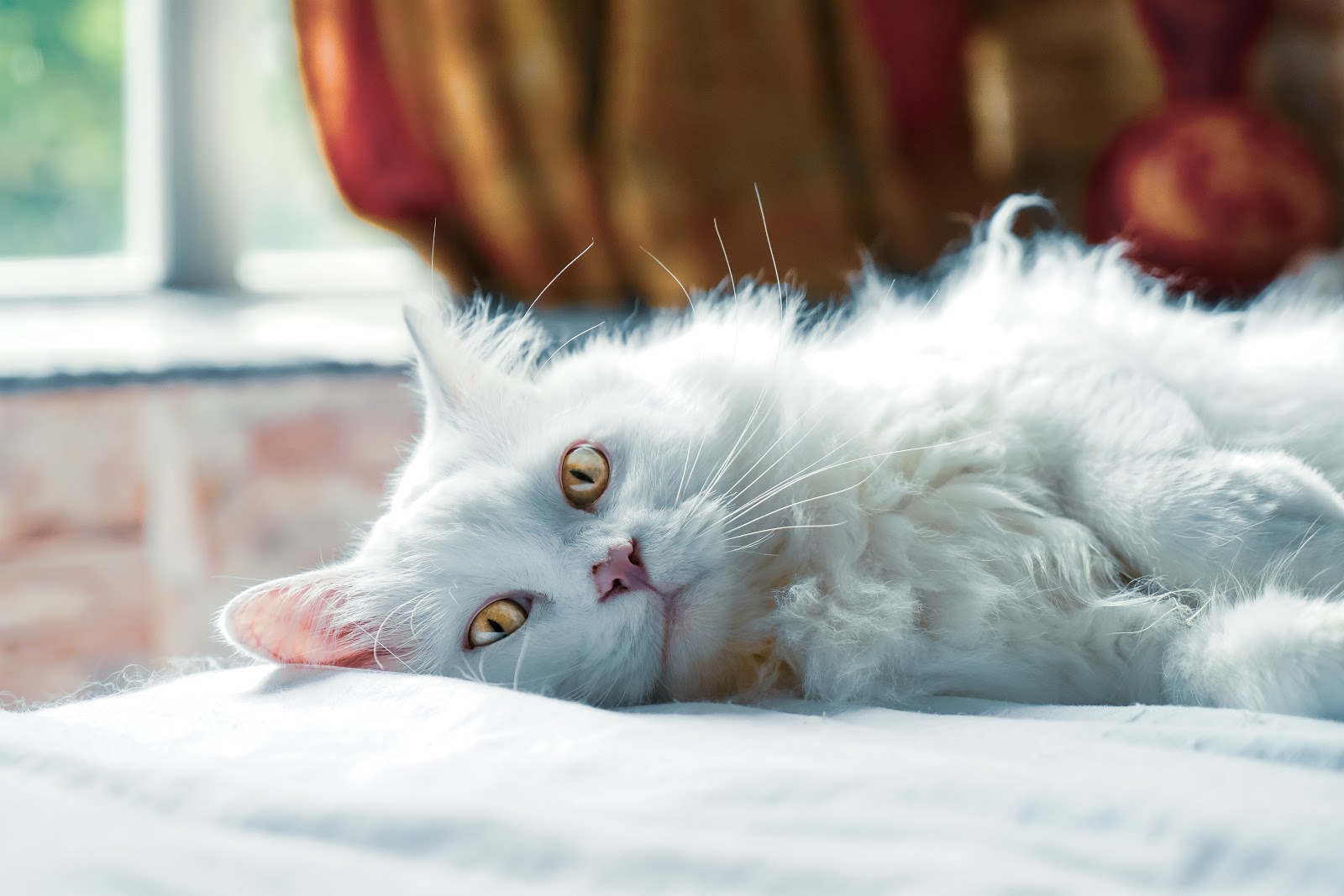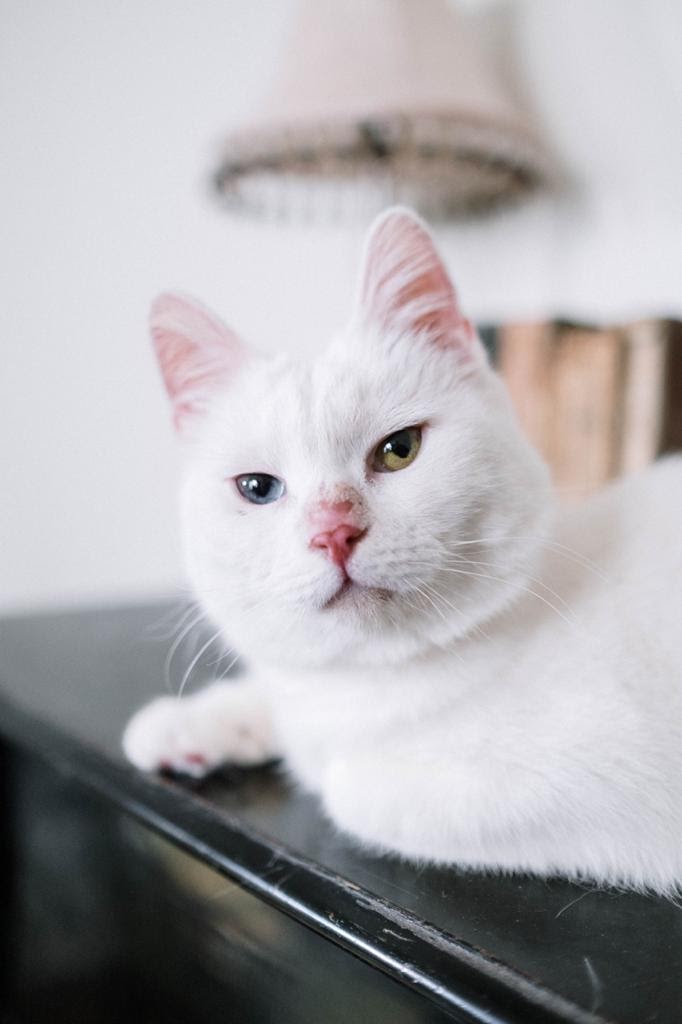Home remedies for cat vomiting are important information that you should be aware of if you have cats, and you've probably seen one of them vomiting once. It is common for cats to vomit, but it is not normal to do so. However, it is also not a serious disease to be treated, and the cat does not need to go to a veterinarian every time he vomits. In this thread, you will learn about home remedies for cat vomiting and you will know when you should take the cat to the vet and you will also know why cats are exposed to vomiting and also the right treatment to help cats improve.

Home remedies for cat vomiting
:Consider changing different food
Your cat may have difficulty digesting her food if you feed her a bad diet, which can cause vomiting. Also, food allergies may be caused if your cat vomits more than normal
Changing the quality of food for the species at the highest quality is a way of home remedies for cat vomiting as it makes it easier for cats to digest food. Also, there is a smart strategy if you want to treat food allergies. Protein sources are rotated so they don't feed the same protein all the time. But if you are not sure that food is not the cause of vomiting, it is better to go to the veterinarian for guidance

Fasting and a Bland Diet
If your cat’s stomach is irritated and she keeps vomiting after she eats. Another way of home remedies for cat vomiting is fasting may allow the cat's stomach to rest. This is by holding water and food for about two hours.
If your cat has fasted for two hours and she hasn’t vomited, you can give her some water. But if your cat isn’t the type to drink water, you can give her some tuna juice to see if she’ll drink that to help her stay hydrated. It’s important to ensure she keeps drinking, even if you are withholding food for a bit because you don’t want your cat to become dehydrated as a result of the vomiting
Start by giving your cat a small amount of food, wait an hour to see if there is any vomiting, then give more. Then, you can continue to give your cat small amounts of a gentle diet every three or four hours. Do this for the first day, working on slowly decreasing the frequency of the meals while increasing the amount of food given.
Do this for two days before increasing the amount of a normal diet with each meal. If your cat is ok with everything without vomiting, this is a good sign.
Strategies to reduce hairballs that cause vomiting
If a cat often vomits hairballs, there are some steps of home remedies for cat vomiting you can take to reduce this type of vomiting. For example, you can brush them daily to remove the excess fur you
swallow.
You might consider adding a small amount of olive oil to your pet's food. A teaspoon a week helps your cat digest food.
Another option is pure canned pumpkin, which can be added to your cat's favorite food to help keep its digestive system running smoothly and to make hairballs move through.

Vomiting caused by motion sickness
Does your cat suffer from nausea and vomiting when traveling with her? This is a common problem, especially among cats that have never traveled before.
If you think vomiting is the cause of stress, there are some home remedies for cat vomiting to help your cat feel better. For example, to help them reduce anxiety when traveling by car, you can try natural remedies, such as cat pheromones. Additionally, there are herbs such as valerian that may help keep your cat very quiet, but it's good to have a conversation with your veterinarian to make sure they're safe to give your cat.
It may also be helpful to reduce the amount of food you provide to your cat before you go out. Feeding your cat several hours before planning to leave home may help reduce your chances of feeling nauseous or vomiting.

Natural remedies for vomiting in cats
Some experts recommend some home remedies for cat vomiting which are natural remedies that you can try at home when a cat feels vomiting.
For example, a little mint may help soothe the cat's stomach, but other herbs may also be effective. If you are considering taking this route, it is best to talk to a veterinarian, such as a thorough veterinarian, who can guide you in the right direction based on your unique cat needs.
When to contact your Vet
Vomiting is considered severe when it lasts for more than two or three days, and this problem usually goes away on its own. But if vomiting becomes chronic or severe, it may lead to other problems, such as dehydration. So, if vomiting doesn't stop, it's best to contact the vets to find out what's going on and get your cat the help you need.
Keep in mind that vomiting may be the result of something simple, such as eating your cat for something you weren't supposed to eat, but it could also be a symptom of something serious, such as poisoning. Also, the conditions that may cause vomiting include intestinal or urinary tract obstruction, thyroid disease, cancer, inflammatory bowel disease (IBD), infection, or liver disease. So you'll want to consult with your veterinarian asap if vomiting does not resolve with simple home remedies for cat vomiting like the ones discussed above.
If you try some home remedies for cat vomiting but your cat is still vomiting frequently and the vomiting is getting worse, or there are symptoms such as lethargy or not indulging, call your veterinarian immediately so that your kitty can be properly examined and treated. Persistent or severe vomiting can be a sign that your cat is seriously ill and requires immediate treatment.
Contact your veterinarian if your cat has any symptoms below:
Frequent vomiting
Blood in vomiting
Weakness/Inactivity
Pain/distress
Fever
Blood in the stool

Chronic and acute vomiting in cats
Vomiting can be separated into two broad categories: chronic and acute vomiting.
Chronic vomiting It means that the cat vomits regularly (at least monthly, but can be daily) for a long time.
Acute vomiting happens when a cat vomits, which usually doesn't vomit. If the cat vomits several times this is a concern for you and your veterinarian only. Diagnosis and treatments for acute and chronic vomiting can vary, so you should consult a veterinarian.
Typically, a cat that vomits only once to three times is considered normal. If the cat wants to eat and does not vomit, behaves normally, and looks comfortable, you don't need to bring it to a veterinary hospital unless you know that it has eaten something toxic and has severe vomiting you should get more care than usual.
If your cat vomits more than three times and can't keep food in her stomach, shows signs of fatigue, and looks stressed, you should take her to a veterinarian as soon as possible and take the right treatment as soon as possible, but if she has some transient nausea and if the cat is too upset or does not want to move, you usually don't have to go to the emergency clinic. You can try home remedies for cat vomiting, but if your condition appears to deteriorate rapidly during the night, it is advisable to make an emergency visit. Cats that vomit constantly and do not keep food in stomach pain are subject to many minor changes, most notably liver disease, so if the cat is late for treatment it may be dangerous for them.

Causes of vomiting in cats
The cause of acute vomiting is similar to the cause of chronic vomiting, but there are exceptions. Toxins are generally not a cause of chronic vomiting (unless the cat is chronically exposed to the same poison, such as eating a poisonous plant). Eating a foreign body is not usually a cause of chronic vomiting, unless the UFO is still in the stomach, it can be a cause of chronic vomiting.
Many cat parents wonder why cats vomit, and there are plenty of reasons why your pet will vomit. For example, vomiting may be associated with your cat's diet or food allergy. It may also happen if your cat ends up eating too fast, or if you go too long without eating. And of course, there are her balls that can be put up as well. But serious issues (such as poisoning) and health issues (such as digestive problems or metabolic disorders) may also be responsible.
If your cat is vomiting too much, it's a good idea to consult with the vet to make sure there are no health problems at play. And because working with your veterinarian can give you what causes your cat to vomit, you can select a solution
Summary
In the end, I would say that if you have cats in your home you should have some information about home remedies for cat vomiting. It's important information you should be aware of. It is also best to know when you should take the cat to the vet, why the cats are vomiting, and also the appropriate treatment to help the cats improve.
Read More:
Home Remedies For Dog Allergies| Itching, Scratch| Causes
Home Remedies For Dog Allergies| Treat Your Dog Easily
Home Remedies For Dog Allergies| The Best 7 Natural Remedies
By: Eman Elnny



You must be logged in to post a comment.